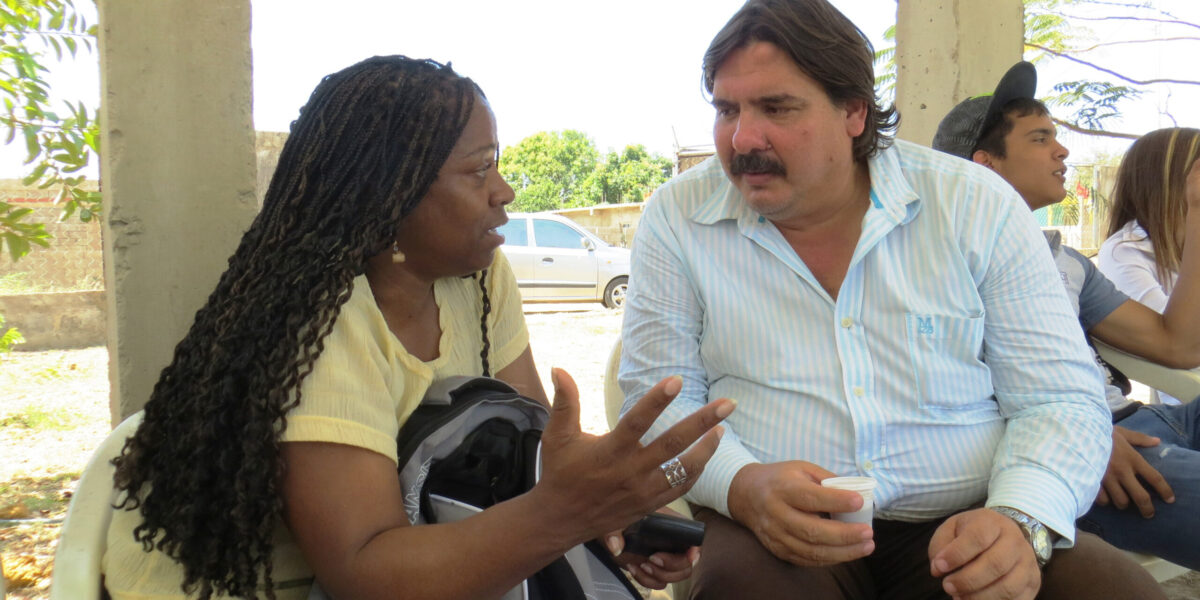ELKHART, Ind. (Mennonite Mission Network) – Excitement for the Anabaptist message is increasing in Venezuela, and the Mennonite seminary there is helping to teach people about Mennonite beliefs and values.
Support from the Seminario Biblico Menonita de Colombia (Colombia Mennonite Bible Seminary) and Iglesia Cristiana Menonita de Colombia (Colombia Mennonite Church) have been important for the Venezuelan seminary. The Colombians have shared course materials, finances, and at times have gone to Venezuela to help teach courses.
The Colombia Mennonite Church would like to increase and formalize their partnership with the Venezuelan churches. In their tradition of shared commitments to ministry, they have invited their partners from the Ecuador Partnership, Central Plains Mennonite Conference and Mennonite Mission Network, to join in this ministry.
This assistance to neighbors is just a natural extension of the Colombian seminary´s purpose, said Zaraí Gonzalía, the executive administrator of the seminary. “In reality, the [Colombian seminary´s] reason for existence is to accompany ministries,” she said.
Gonzalía has been instrumental in accompanying the theological education and development of the Mennonites in Venezuela.
As an example of how Colombian leaders have helped Venezuelan leaders, in May, Gonzalía and Martha Lucía Gómez helped facilitate the first Sister Care workshop for women in Venezuela. Both women are co-coordinators of the Latin American Women Theologians Movement for the Andean region. Mennonite Mission Network provided some of the funds for the workshop.
Originally, three Venezuelan women planned to go to a training workshop in Colombia, where they would learn how to facilitate a Sister Care workshop.
“Since only one woman was able to come, we thought, ‘Why not go there,’” said Gonzalia. “We wanted to spread the workshop and present the women’s movement to them.”
Historically, Venezuela and Colombia were part of one nation created by the Spanish government in the 16th century when they invaded South America. For almost 300 years, the countries that are now Colombia, Ecuador, Panama and Venezuela – along with parts of Brazil, Guyana and Peru – were all one territory that first was a kingdom and by the 1800s was a country.
Erwin Mirabal, one of the leaders of the growing Mennonite churches in Venezuela, said that Mennonites in Venezuela and Colombia have worked together since the 1980s.
Mirabal became committed to Anabaptist theology through a course he took when he was a youth. John Driver, a former Mennonite Mission Network worker, presented the course in Colombia, but invited Mennonites from Venezuela also. Now, Mirabal encourages congregations to participate in the seminary courses. He also teaches some courses.
“In the Venezuelan context of polarization and violence, where every group tries to manipulate us with their slogans of ‘Revolution and Justice’ on one hand, and ‘Democracy and Liberty’ on the other, the message of the cross, of reconciliation with enemies and following Jesus, should be proclaimed with all of our strength,” said Mirabal.
The connection between the Venezuelan churches and the Colombian churches didn´t stay strong though, said Mirabal. Part of the reason he gave for the distancing was that many of the leaders of the Anabaptist movement in Venezuela were Pentecostal and Assembly of God, so they were still figuring out their relationship with Anabaptists and Mennonites.
Since the Colombian churches had continued to strengthen their ministries, including a mission committee and the seminary, they were prepared to bring their resources and classes to Venezuelan churches.
Mirabal explained that Alix Lozano, the coordinator of the Colombian seminary at the time, helped establish a seminary in 2001 on Isla Margarita, an island off the coast of Venezuela where these churches started. The seminary classes stopped in 2004, but restarted in 2009. There are currently 82 students taking classes with the seminary, said Mirabal. In addition to the seminary on the island, there are satellites in the towns of Maracay and Caracas where new Mennonite congregations have developed.
“It excites me to see that the seminary and its message are well received by the Christian people and communities of other denominations,” said Mirabal. “They’re excited to know and experience the transforming power that [the gospel] message has on our lives.”
As energy for Anabaptist Mennonite theological education increases in Venezuela, the Colombian church and mission committee look for more ways to support their neighbors.
After the March 2013 Ecuador partnership meeting, the partners traveled together to Venezuela. These meetings led to the invitation from the Colombian and Venezuelan churches for Mennonite Mission Network and Central Plains Mennonite Conference to also partner in Venezuela.
“Beginning partnership is a journey,” wrote Don Kempf in a document from June 2014 stating the conference’s intent to accept the invitation. Kempf is the coordinator of the Central Plains Mennonite Conference Ecuador Partners in Mission. “We don’t know now exactly what it will look like. What we do know is that the Holy Spirit is working in exciting ways in Venezuela.”
Oscar Herrera Rodriguez, the coordinator for the Colombian church’s mission committee, said, “Venezuela has been a sister country for us, and historically, we were one nation, one people. Just as it is important for Colombia to find peace, it is also important for Venezuela to maintain peace. So the message of the gospel of peace and nonviolence that the Mennonite Church preaches continues to be relevant.”
###
For immediate release
Mennonite Mission Network, the mission agency of Mennonite Church USA, leads, mobilizes and equips the church to participate in holistic witness to Jesus Christ in a broken world. Media may contact news@mennonitemission.net.







